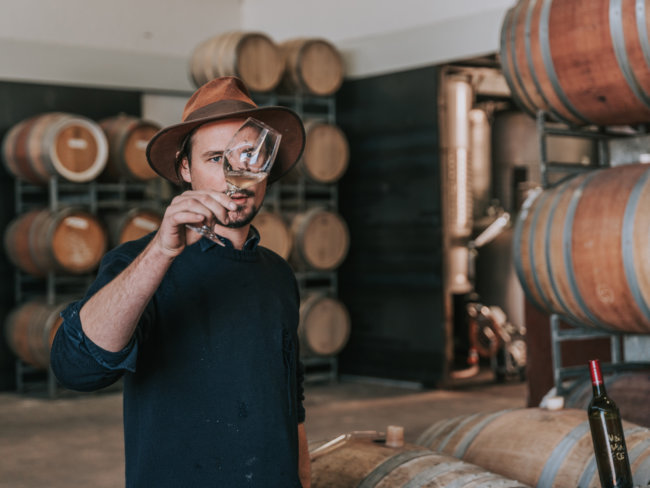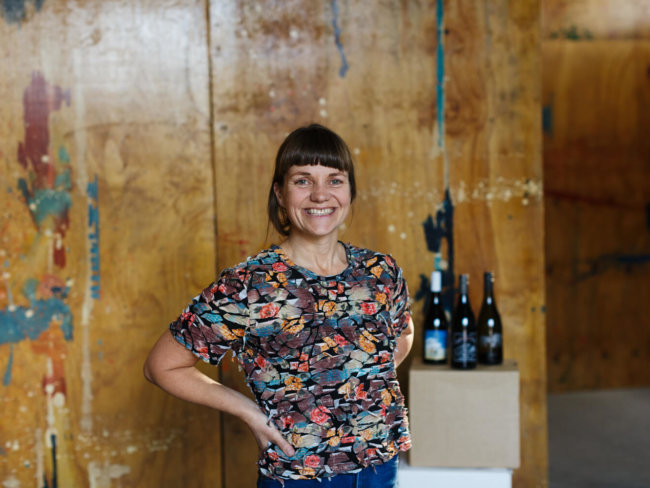Chris Carpenter grew up on the family vineyard, Lark Hill. And but for a science degree that got diverted to wine science, as well as vintages with Penfolds and Seppeltsfield, that’s more or less where he has remained. Working primarily with chardonnay, pinot noir, riesling and grüner veltliner from their cool site, as well as shiraz, sangiovese and viognier from Murrumbateman, the certified biodynamic Lark Hill wines are elegant expressions of varieties ideally suited to their sites. Carpenter was a Young Gun finalist in 2017.
Chris Carpenter’s family vineyard is one of the Canberra District’s oldest. It’s also one of the coldest. Clocking in at 860 metres above sea level, a dusting of snow in winter is not an unfamiliar site on the granitic site north-east of Canberra, in Bungendore. Carpenter’s parents, Sue and Dave, first planted the site in 1978, but since 2003, fresh from high school, Carpenter has been pivotal in the development of Lark Hill as a leader both in the region and the industry more broadly. And while 2003 may have marked his official role there, the apprenticeship started much earlier.
“I grew up with my parents growing grapes and making wine – I guess it was always in my blood,” says Carpenter. “We have countless photos of me as a little kid helping out to pick grapes, clean tanks and bottle the wine. I learnt to drive on a tractor, not in a car. I guess I can’t really name a time when I decided I was going to be a winemaker.”
Heeding a recommendation from Jancis Robinson when she visited the vineyard in 2002, Carpenter planted grüner veltliner in their site in 2004, and he released Australia’s first commercial grüner from the 2009 vintage. Since then, Lark Hill have become a benchmark new world producer of the variety. Carpenter was also instrumental in working with his parents to convert their vineyard to biodynamic farming methods. In 2003, the certification process was begun, and the first certified wines were produced in 2008.
Going a step further, the vineyards are now managed without recourse to the copper and sulphur mix used in most organic and biodynamic vineyards to manage disease pressure. Instead, a milk spray is used to promote beneficial fungi that combat more sinister ones. The overuse of coper and sulphur in organic vineyards can be a major cause for concern, so this is a significant step that improves on existing best practices.
In 2011, a second site was purchased. The Dark Horse vineyard is in the golden zone of Murrumbateman and planted to sangiovese, syrah, marsanne, roussanne and viognier and is similarly certified biodynamic. Carpenter sees the original Lark Hill site as one of the few in Canberra that is cool enough to grow pinot noir, while varieties like shiraz and sangiovese thrive in Murrumbateman not just because it is lower and warmer there, but also because of the granitic soil, which is not replicated elsewhere in the region.
Carpenter has an encyclopaedic knowledge of the subtleties of the Canberra Districts vineyards, of its soils and its macroclimates, which very much form his forward-thinking approach. The Dark Horse vineyard was essential for Lark Hill’s progression, not just because that’s where the regional star, shiraz, thrived, but because Carpenter has an ardent belief that sangiovese will one day rival it, if not exceed it.
Carpenter is refining those plantings at Dark Horse, and he’s also adding other varieties to test their suitability.
“Last year we replanted some of it to a higher-quality Sangiovese clone (a Brunello isolate), and this year we’ll be pulling out some Viognier to plant some interesting alternate Italian whites and reds.”
Alongside the Lark Hill the Dark Horse vineyards, Carpenter has recently started to dabble more broadly. “The wines from these vineyards are made as single-vineyard wines and labelled as such – I like to celebrate and treasure the provenance of their site and style. Recently I’ve added a third part to the brand; a series of ‘regional’ wines made from fruit I buy from around Canberra – these are wines made to embrace all that is wonderful about the Canberra Region without the quantity and cost constraints of single-vineyard, certified biodynamic fruit.”




